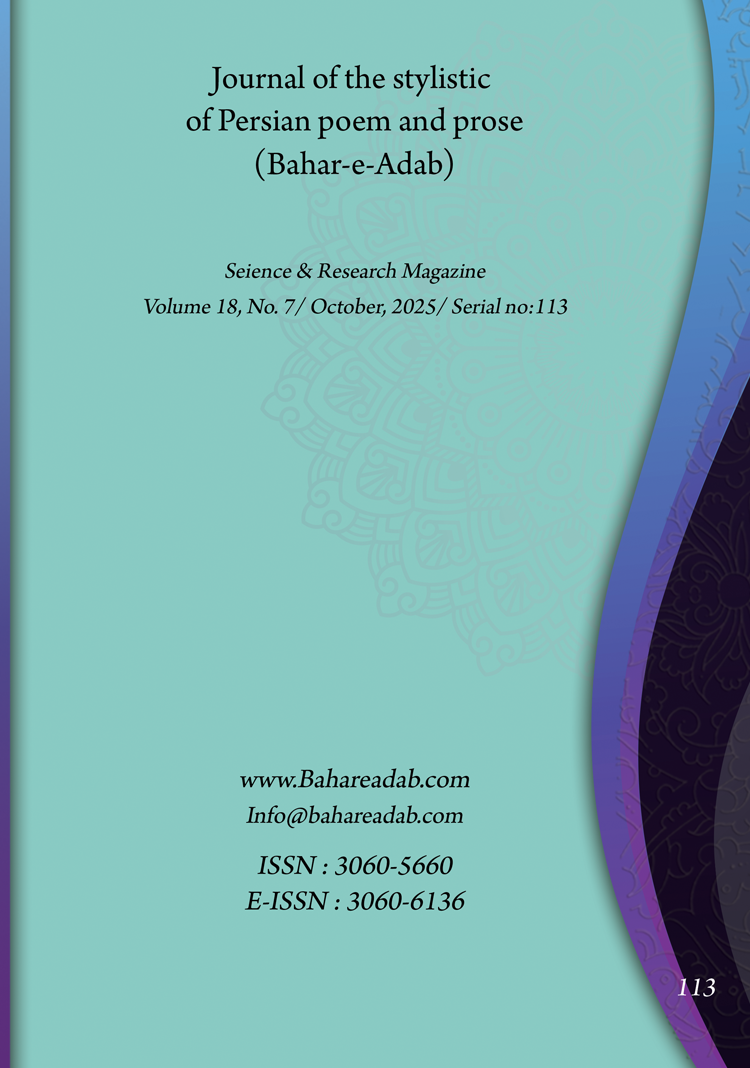- Count View : 316
- آدرس کوتاه شده مقاله: https://bahareadab.com/article_id/1882
- کد DOI مقاله: DOI:10.22034/bahareadab.2025 .18 .7920
Journal of the stylistic of Persian poem and prose
volume Number 18،
number In Volume 7،
،
issue Number 113
Reflection of Blindness in the Works of Attar and Rumi
Afsaneh Ahangari , Ahmad Ghanipour Malekshah (Author in Charge), Masoud Rouhani , Hossein Hassanpour Alashti
Abstract
BACKGROUND AND OBJECTIVES: Blindness is a type of physical disability that has been used symbolically and metaphorically in Persian literature, especially in mystical texts. However, less attention has been paid to the way blind individuals live and their social interactions, as well as the beliefs surrounding them. The present research focuses on this latter aspect of blindness in the works of Attar and Rumi, aiming to understand their dual perspectives on blind individuals.
METHODOLOGY: This study was conducted using a descriptive-analytical approach through library research, data collection, and analysis of the sources.
FINDINGS: The findings indicated that due to the prevalence of incorrect and superstitious beliefs, a negative and unjust perception of disabled individuals, including the blind, has been prevalent, and this negativity is reflected in some of the works of Attar and Rumi.
CONCLUSION: Attar and Rumi have a moral approach to blindness and have considered it a kind of divine punishment that is the result of stubbornness, rebellion, and suffering from sin. Attar has not paid much attention to the aspects of the lives of the blind in his works and has used their existence to explain and justify some mystical and moral meaning. Although Rumi"s stories sometimes witness contradictions about the blind, at the same time there are signs of empathy and respect for them. Rumi has not considered disability to be an obstacle to communication with the Creator and personal growth.
Keyword
blindness
, blind people
, disability
, Attar
, Rumi
, works
- The Holy Quran
- Ahmadi, Babak (1997). Four Reports from the Taskereh-ol-Auliya, Tehran: Markaz.
- Islami Nadushan, Mohammad Ali (2016). Voices and Gestures, 6th edition, Tehran: Ghatre Publications.
- Afrooz, Gholam Ali. (2003). An Introduction to Psychology and Education of Exceptional Children. 21st edition, Tehran: Tehran University Press.
- Berton, Elizabeth and Lane, Mitchell (2013). Inclusive Urban Design: Streets for Life. Translated by Elahe Saki and Sanaz Fanaei. Tehran: Armanshahr.
- Borjian, Mansour (2016). The World's Greatest Disabled People, 7th edition, Tehran: Soroush.
- Bani Hashemi, Seyyed Abdullah and Gholamzadeh Safa, Hossein (2012). 7th edition, Tehran: Payam Noor University Press.
- Pournamdarian, Taghi (2012). Codes and Code Stories in Persian Literature, 8th Edition, Tehran: Scientific and Cultural Publications.
- Hossein bin Mohammad, Raghib Isfahani (2013). Vocabulary of the Quran, translated by Hossein Khodaparast, 6th Edition, Qom: Navid Publishing House.
- Dehkhoda, Ali Akbar. (1993). Dehkhoda Dictionary, Volume 13, First Edition, Tehran: Tehran University Publishing and Printing Institute.
- Rajai, Bukharaei, Mohammad Ali (1985). Dictionary of Hafez's Poems, Fourth Edition, Tehran: Scientific Publications.
- Zarrinkafshian, Gholam Reza. (2016). Disabled. Tehran: Sepehr Andisheh.
- Zarrinkoob, Abdolhossein (1989). Bahr Darkozeh, Third Edition, Tehran: Scientific Publications.
- Zarrinkoob, Abdolhossein (1999). The Secret of the Ney, Volume 1, Eighth Edition, Tehran: Scientific Publications.
- Zamani, Karim (2006). Comprehensive Explanation of the Spiritual Mathnavi, Second Book, 14th Edition, Tehran, Information Publications.
- Saadi, Mosleh bin Abdullah (1986). Saadi's Golestan, edited by Mohammad Ali Foroughi, 6th Edition, Tehran: Amir Kabir.
- Shafi'i Kadkani, Mohammad Reza (1993). In the Land of Illumination, 7th Edition, Tehran: Agh.
- Sanataniyya, Fatemeh. (1989). Sources of Stories and Allegories from the Mathnavis of Attar Neyshabour, Tehran: Zavar
- Attar Neyshabouri, Sheikh Farid al-Din. (1991). Tazkir al-Awliya. Edited by Mohammad Istalami, 26th Edition, Tehran: Zavar.
- Attar Neyshabouri, Mohammad bin Ibrahim. (1989). Ilahinama. Introduction and Edited by Mohammad Reza Shafi'i Kadkani, 5th Edition, Tehran: Sokhan.
- Goffman, Irving. (1999). The Mark of Shame. Translated by Masoud Kianpour, 5th edition, Tehran: Markaz Publishing House.
- Mohammad Baqer, Majlesi (2007). Bihar al-Anwar, 4th edition: Qom: Islamieh Publishing House.
- Moshir Salimi, Ali Akbar (1965). Blind Speakers - Sighted Blind People, Tehran: Scientific Publishing House.
- Mousavi, Mir Sajjad (2004). Familiarity with the Tools and Aids of the Blind. Mashhad: Astan Quds Razavi Publishing House (to be published).
- Molavi, Jalal al-Din (1991). Masnavi Manavi, Second Edition, Edited by Reynolds Nicholson, Eighth Edition, Tehran: Molavi Publishing House.
- Molavi, Jalal al-Din (1991). Masnavi Manavi, Third Edition, Edited by Reynolds Nicholson, Eighth Edition, Tehran: Molavi Publishing House.
- Molavi, Jalal al-Din Mohammad Balkhi (1991). Rumi's Mathnawi, Volume 1, edited by Reynolds Nicholson, 8th edition, Molly Publications.
- Najafi, Abolhasan. (2008). Persian Folk Dictionary. Second edition. Tehran: Niloufar.
- Najmabadi, Mahmoud. (1992). History of Medicine in Iran. Volume 1, Second edition, Tehran: Tehran University Press.
- Volk, Rene (1994). Theory of Literature, translated by Parviz Mohajer and Zia Movahed, Tehran: Scientific and Cultural Publications.
- Hallahan, Daniel and Kaufman, James M. (1993). Exceptional Children, translated by Farhad Maher, Volume 2, First edition, Tehran: Roshd Publications.
- Articles:
- Habibvand, Masoumeh; Moniri, Hojjatollah and Tafazzoli, Sadegh (1998). A study of the intellectual style of the Masnavi, a case study of the concept of Ahuliyyat in the Masnavi Manawi, Journal of Persian Poetry and Prose Stylistics (Persian Literature), No. 80, pp. 61-79.
- Arvan, Kamran (2018). "The Social Status of the Disabled in the Qajar Era". Two Quarterly Scientific-Research Journals of History. Year 13, No. 4, Winter 2018, pp. 16-37.

